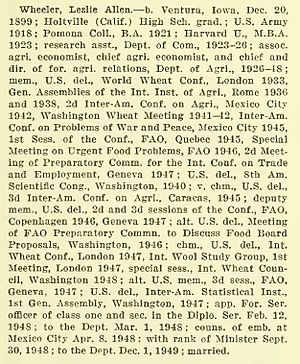Leslie A. Wheeler
In 1930 he was assigned to the newly created Foreign Agricultural Service as the de facto Assistant Chief, though without the formal title.
For the first few years of the Foreign Agricultural Service's existence, it was primarily occupied with statistical reporting and commodity analysis.
This sparked retaliatory, prohibitive tariff increases from trading partners that led to a catastrophic collapse of export sales, worsening already-bad economic conditions during the Great Depression.
[4] In August 1941 Wheeler was additionally appointed to the Economic Defense Board, and the Washington Post's "Federal Diary" column remarked August 13, 1941, These were veiled references to two U.S. Government priorities: stabilization of wheat prices by coordinating supply and demand between major wheat exporters and members of the British Commonwealth, and boosting South American production of strategic commodities on the eve of World War II.
In addition, the U.S. Government made a conscious effort to allow the U.S. to substitute for Latin America's lost export markets in war-torn Europe, to diminish the influence of Nazi sympathizers in Argentina, Chile, and other parts of Latin America, and to prevent creation of tight economic ties between those countries and Germany.
The council went to work on creating a 100-million-bushel "relief reserve" for feeding starving citizens of Axis-occupied nations after their expected liberation, and agreement on wheat production quotas among the United States, Canada, Australia and Argentina.
This work was described as "reports for the Army and Navy and other war agencies on the food situation and problem in enemy, enemy-occupied, and allied countries" and "plans for the relief and rehabilitation of liberated areas."
Despite Wheeler's assurances to Congress that the focus would be on non-competitive agricultural products, one long-term consequence of this was the need to improve the efficiency of indigenous food production so Latin American farmers could divert some of their cropland to strategic commodities like rubber, latex, burlap fiber, rotenone, quinine, and manila hemp, not to mention cocoa and coffee.
While the OFAR budget was being debated in the House and Senate (and at one point being pegged at a parsimonious $428,000), Wheeler lunched with a State Department friend at the Cosmos Club, Ambassador Christian M. Ravndal, who asked him why he didn't consider joining the Foreign Service under the Special Manpower Act.
Ravndal sent Wheeler's nomination forward to be appointed counselor of embassy (in those days deputy chief of mission) and consul general at Mexico, rank of FSO-1.
[10] Wheeler did not enjoy his tour in Mexico City and made his desire to be moved known to visiting State Department officials.
He returned temporarily to Federal service for six weeks in 1952 to serve as chair of the American delegation to agriculture negotiations in London.
[12] Following that, Wheeler worked as a consultant to private foundations, including the International Federation of Agricultural Producers, and the United Nations.
In October 1967 Wheeler left his home in Chevy Chase, Maryland, to stay with his sister in Claremont, California, while undergoing treatment for cancer.
